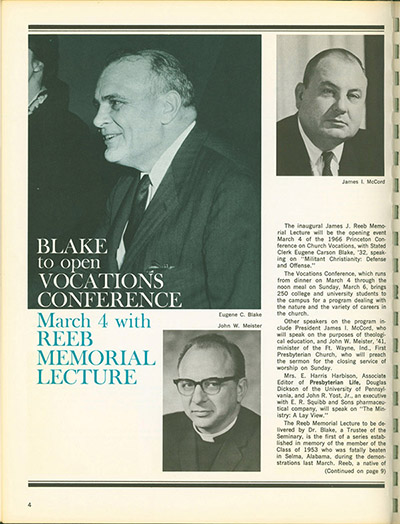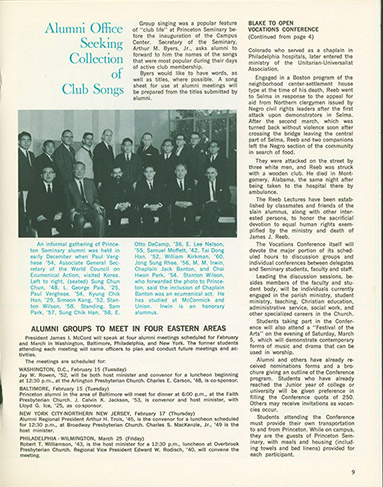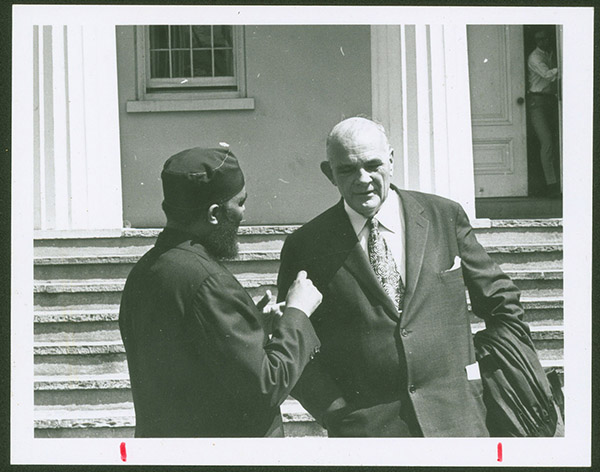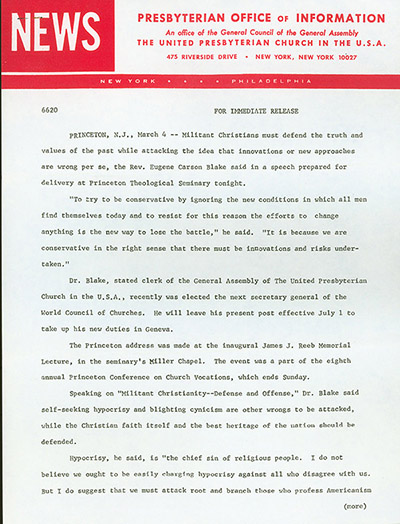Invoking the 19th century hymn, “Onward Christian Soldiers,” Eugene Carson Blake urged those at the first Reeb Memorial Lecture to adopt a “militant Christian faith,”
to defend what is good and cherish it, to attack what is evil and destroy it. Such faith gives meaning to human life and hope to a revolutionary and changing world.
How do his words resonate among global religious movements of the 21st century?
Larger than life in his physical and ecclesiastical stature, Blake spoke directly to the role he believed Protestant Christians were called to take in confronting societal challenges of the 20th century. His lecture, “Militant Christianity—Defense and Offense,” (audio recording also available) mirrored his ministry.

Eugene Carson Blake was born Nov. 7, 1906, in St. Louis in a conservative Presbyterian family. His father was a steel industry employee and a Presbyterian elder. Blake attended public schools and later the Lawrenceville School in Lawrenceville, N.J., where Thornton Wilder was one of his teachers. In 1928 he was graduated with honors in philosophy from Princeton University, where he played guard on the varsity football team. He married Valina Gillespie, who died in 1973. They had no children. He later married Jean Ware.
After college, Blake pursued graduate study at New College, Edinburgh, Scotland, and taught at Forman Christian college in Lahore, India. He returned to the United States and attended Princeton Theological Seminary, receiving a Bachelor of Theology degree in 1932. Paul A. Crow Jr. wrote that Blake, “forged for himself a biblical realism that gave solid theological foundations and moral relevance to one who was to lead the church in an era of turbulence and change.”

During the 1930s Blake served pastorates in New York City and Albany. In 1940 at age 34 Blake was called to be minister of Pasadena Presbyterian Church, one of the largest Presbyterian congregations in the United States, with 3,500 members. During his pastorate membership grew to 4,500, and Blake became a national church leader. In 1951 he became stated clerk of the United Presbyterian Church in the USA (until 1958 the Presbyterian Church in the USA), the denomination’s highest position, which he held for three successive terms until 1966.
Blake was a delegate to the 16th, 17th, and 18th General Councils of the World Presbyterian Alliance in 1948, 1954, and 1959. He was president of the National Council of Churches from 1954 to 1957. During that time, at the height of the Cold War and McCarthyism he led a church delegation to the Soviet Union for ten days as guests of the Russian Church. He was a delegate to the Second and Third Assemblies of the World Council of Churches held in 1954 in Evanston, Ill., and 1961 in New Delhi, India. In 1960 he preached at Grace Cathedral in San Francisco for a union of Presbyterian, Episcopal, and Methodist Churches with the United Church of Christ, a stand that led to creation of the Consultation on Church Union in 1962.

Eugene Carson Blake was remembered as a “Christian diplomat” who used his international positions to advance church unity and social justice. He served as WCC general secretary from 1966-1972 and helped launch the WCC’s Programme to Combat Racism. In July 1963 he was arrested along with other clergy who tried to integrate an all-white amusement park in Maryland. Upon his arrest he said, “I would not know whether the law is constitutional. All I know is that it is not right.”
The following month he joined the March on Washington, speaking at the Lincoln Memorial. With other civil rights leaders, including Martin Luther King, Jr., John Lewis, and Whitney Young, he met at the White House with President John F. Kennedy and Vice President Lyndon Johnson. President Johnson asked Blake to lead formation of an interfaith lobby that helped secure passage of the 1964 Civil Rights Act. The Johnson Administration would later declare him “unacceptable to the White House as a religious representative” for his protest against the Vietnam War and American foreign policy. In his 1966 Reeb lecture, Blake said,
To follow Jesus Christ is not to be a romantic idealist, but to believe despite the sin of man, realistically observed, that men may be converted by the power of God. To be a Christian is to believe that with God the battle may be won in this world now and in eternity.
Over the course of his ministry Blake received eight honorary doctorates from such institutions as Occidental College, Princeton University and University of Pittsburgh. He was a trustee of Princeton Seminary from 1954 on, of which one colleague wrote, “His pride in and love for Princeton Theological Seminary were lyrical.” Upon retirement he was a leader in Bread for the World, the Christian anti-hunger organization. A Princeton Seminary Bulletin eulogy referenced Blake’s words at the Lincoln Memorial:
Only as a rhetorical device could he have claimed he came with those white clergy who were late in bringing their support for racial justice. In this as in all the social causes where he so deeply felt called to serve Christ and His Church, Gene Blake was never late in his life.
Eugene Carson Blake died in 1985 at age 78.
